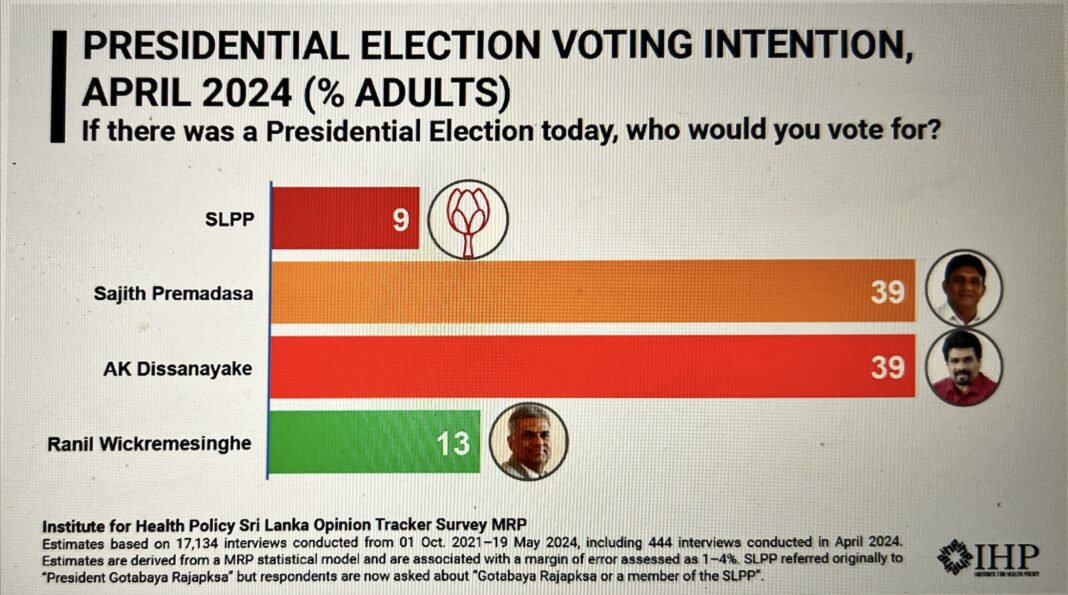Support for leftist candidate Anura Kumara Dissanayake dropped six percentage points to 39 percent in April, levelling with opposition leader Sajith Premadasa, while support for President Ranil Wickremesinghe increased three points to 13 percent in a presidential election voting intent poll.
The Sri Lanka Opinion Tracker Survey (SLOTS) conducted by the Institute for Health Policy showed that, according to its Multilevel Regression and Poststratification (MRP) provisional estimates of presidential election voting intent, National People’s Power (NPP) leader Dissanayake and main opposition Samagi Jana Balawegaya (SJB) lader Premadasa were now neck and neck while United National Party (UNP) leader Wickremesinghe had made some gains. A generic candidate for the ruling Sri Lanka Podujana Peramuna (SLPP) had the support of 9 percent of the people surveyed, up 1 percentage point from March.
These estimates use the January 2024 revision of the IHP’s SLOTS MRP model. The latest update is for all adults and uses data from 17,134 interviews conducted from October 2021 to 19 May 2024, including 444 interviews during April 2024. According to the institute, 100 bootstraps were run to capture model uncertainty. Margins of error are assessed as 1–4% for April.
SLOTS polling director and IHP director Ravi Rannan-Eliya was quoted as saying: “The SLOTS polling in April suffered from a lower response rate owing to the New Year holidays, and we think this may have skewed the sample in favour of SJB supporters. The early May interviews partly compensated for this, and it’s possible that our June interviews may result in further revisions
to our model estimates.
Rannan-Eliya also noted that a number of other internet polls may be overestimating support for the NPP or its main constituent party the Janatha Vimukthi Peramuna (JVP) by about 10 percent.
“We’ve been asked about some other recent internet polls that showed much higher levels of support for the NPP/JVP. We think these over-estimate NPP/JVP support. SLOTS routinely collects data from all respondents on whether they have internet access, and whether they are willing to participate in an internet survey. These data show that NPP/JVP supporters are far more likely to have internet access and even more likely to be willing to respond to internet surveys, and this difference remains even after controlling for past voting behaviour. Our data indicates internet polls may overestimate NPP/JVP support by about 10 percent, and for this kind of reason we have previously decided that the time is not right to do internet polling,” he said.
According to the IHP, its SLOTS MRP methodology first estimates the relationship between a wide variety of characteristics about respondents and their opinions – in this case, ‘If there was a Presidential Election today, who would you vote for?’– in a multilevel statistical model that also smooths month to month changes. It then uses a large data file that is calibrated to the national population to predict voting intent in each month since October 2021, according to what the multilevel model says about their probability of voting for various parties (‘post-stratification’) at each point in time. The multilevel model was estimated 100 times to reflect underlying uncertainties in the model and to obtain margins of error, the institute said. (Colombo/Jun03/2024)
